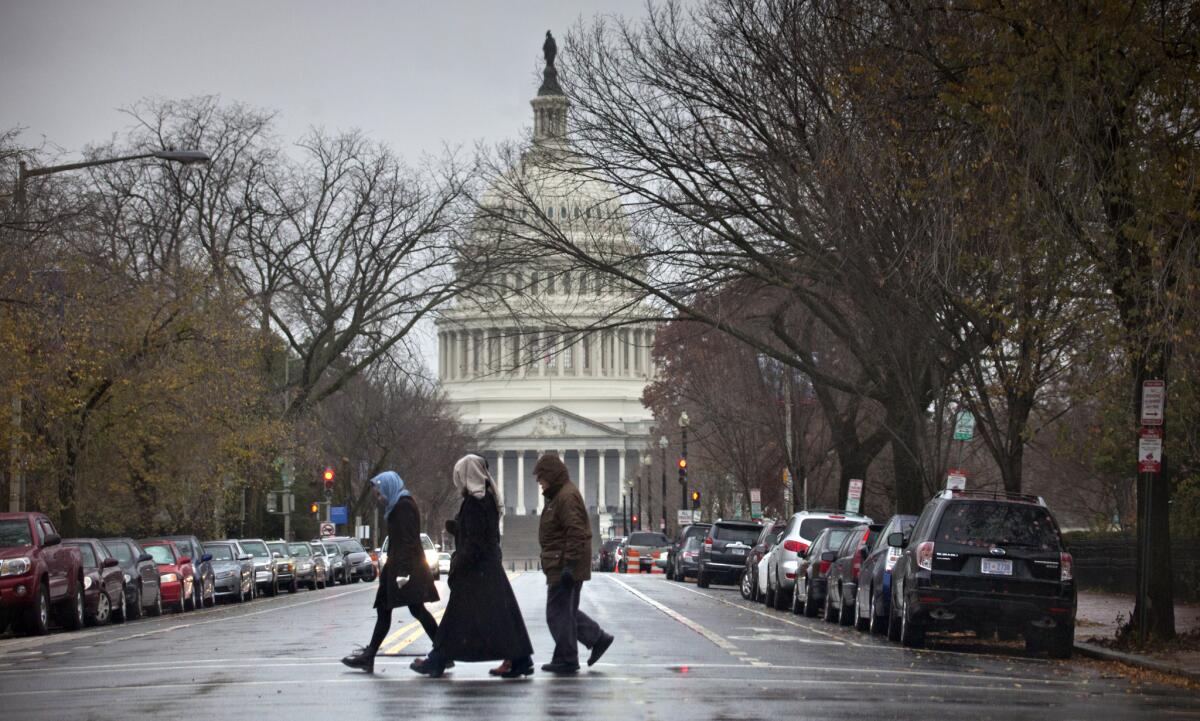2014 forecast for D.C.: Still stormy

- Share via
“Congress is finishing this year less popular than a cockroach,” Senate Majority Leader Harry Reid (D-Nev.) said the other day. The reason, he charged, was simple: “mindless, knee-jerk obstruction from Republicans.”
Sen. Bob Corker (R-Tenn.) sees things differently. “As long as Harry Reid is the majority leader,” he said, “the Senate will increasingly be a dysfunctional place.”
It would be nice to think that Congress’ easy passage of a bipartisan compromise on the federal budget this month was the sign of a new spirit of cooperation on Capitol Hill. But in the hallways of the Senate last week, there was little evidence of bipartisanship, or even Christmas cheer.
“We need a cooling-off period,” Sen. Lisa Murkowski (R-Alaska) told me. “I’ve raised two boys. Sometimes you need to go to separate rooms to cool down.”
Indeed, next year is unlikely to get better, for one simple reason: It’s a congressional election year. And not an ordinary election year. A significant number of Republican incumbents in both the House and Senate will face primary challenges from tea party conservatives.
That means that some of the legislators who were once likely to seek cross-aisle compromises will be trying to show how tough and conservative they are. Getting Democrats and Republicans to agree on anything will be harder than ever.
“Good things seldom happen in election years,” noted former Rep. Bill Frenzel, a moderate Republican from Minnesota.
Where are the conflicts likely to come? Rep. Paul D. Ryan (R-Wis.), who fashioned the bipartisan budget deal with Sen. Patty Murray (D-Wash.), has already promised another collision over the federal debt ceiling.
Republicans have tried several times to use the debt ceiling — the limit on the Treasury’s authority to borrow — as leverage to force fiscal concessions from President Obama, even though refusal to raise the limit could lead to a default on the federal debt and disastrous consequences for the economy.
“We will not want to walk away with nothing” from a debt ceiling vote, Ryan vowed on CNBC, although he added that the GOP caucus hasn’t yet decided what to ask for in return.
Sen. Mitch McConnell (R-Ky.) seconded the idea, noting that the debt ceiling is one way for Republicans to “get the president’s attention.”
The only good news in this picture is that the disastrous government shutdown in October may have taught both sides a thing or two about how to avoid needless catastrophes.
Ryan says Republicans have learned a lesson from that episode. Next year, he said, they’ll be looking for goals that are practical, not unreachable. “You can’t let the perfect be the enemy of the good,” he said.
That was the message House Speaker John A. Boehner (R-Ohio) was trying to reinforce when he denounced conservative organizations for pushing his caucus into the October shutdown, advisors say. Boehner has told House members that even though he welcomes a fight over the debt ceiling, he doesn’t want to risk a federal default, especially in an election year.
“If it happened, we’d get blamed for it,” a Boehner advisor noted.
On the other side, even though Obama insists he will refuse to negotiate over the debt limit, that doesn’t mean nobody will negotiate.
In two debt limit battles this year, Obama refused to bargain — but Reid stepped in and helped arrange a deal. In both cases, Republicans agreed to “suspend” the debt ceiling; Democrats didn’t give up much of substance in return, but they did make procedural concessions.
Obama’s absence from those negotiations wasn’t a problem; it was a plus. Especially in an election year, Republicans don’t want to be tarred as too eager to compromise with a man conservatives love to loathe. A deal with Reid looks better; a compromise with the less-pugnacious Murray, better still.
So, with luck, what we can hope for next year is a return to what you might call “normal” partisan warfare: tough, sometimes even angry, but not as destructive (or, in the Republicans’ case, self-destructive) as before. Just don’t expect much to get done.
There won’t be a grand bargain over spending and taxes; that has turned out to be unreachable. But there may be a bit more progress on massaging the budget cuts of the sequester, a process Ryan and Murray began this month.
There probably won’t be an increase in the minimum wage, although there could be an extension of long-term unemployment benefits.
And there won’t be a grand compromise over a comprehensive immigration reform bill. The House will try to pass some piecemeal measures, but the two parties remain far apart on whether to offer undocumented immigrants a pathway to citizenship.
And you thought this year’s Congress didn’t get much done.
Still, if the legislators can get through 2014 without provoking a crisis, that will count as progress. When it comes to Congress, we’ve learned to grade on a curve.
Twitter: @DoyleMcManus
More to Read
A cure for the common opinion
Get thought-provoking perspectives with our weekly newsletter.
You may occasionally receive promotional content from the Los Angeles Times.








